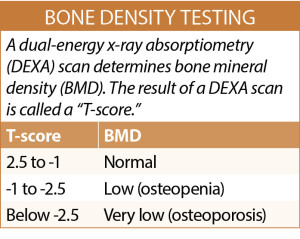Nutrients Needed for Strong Bones
When it comes to nutrition and bone health, vitamin D and calcium tend to get most of the attention. That’s fair, since those two nutrients are the keys to keeping bones strong. But other vitamins and minerals are important to bone health, too.
“In addition to calcium and vitamin D, it’s also important to consume adequate amounts of magnesium, vitamin K, and vitamin A to maintain optimal bone health,” explains Tanya Freirich, MS, RD, CDN, a registered dietitian at NewYork-Presbyterian Weill Cornell.
A balanced diet that includes low-fat dairy, a mix of fruits and vegetables (especially the dark, leafy green vegetables), nuts and seeds, and fatty fish can provide the nutrients you need to help keep your bones strong.
Bones are constantly changing
Your bones are in a constant cycle of resorption (breakdown) and formation (buildup), a process called “remodeling.” Remodeling relies on cells called osteoclasts and osteoblasts: Osteoclasts break down existing bone, and osteoblasts form new bone material by secreting osteoid, a substance composed of collagen and other proteins. Osteoblasts also help deposit calcium and other minerals in the new bone.
The process of forming new bone peaks in your 20s. As you near menopause, you start to lose bone density faster than your body can produce new bone.
Osteopenia is the term for lower-than-normal bone density; osteoporosis describes very low bone density, which increases your risk of bone fractures (see box, “Bone Density Testing”).
How calcium helps
While you can’t do anything about time passing, you can take steps to put the brakes on bone density loss.
One of the most important strategies is to boost your calcium intake. Most of the body’s calcium is stored in the bones. But calcium also plays an important role in muscle health and circulation. If there isn’t enough calcium available for those purposes, calcium is withdrawn from the bones, weakening them. Women age 50 and older should get at least 1,200 milligrams (mg) of calcium per day. The safe upper limit is about 2,000 mg per day.
Milk, yogurt, and cheese are excellent sources of calcium. Non-dairy sources include kale, broccoli, and other green, leafy vegetables, along with sardines and other soft-bone fish. Products, such as breakfast cereals, non-dairy milks, tofu, and juices, are also fortified with calcium.
It’s possible to consume enough calcium from dietary sources, but your diet may not provide enough, especially for women who don’t eat or drink a lot of dairy products. For these women, calcium supplements may be appropriate.
“Boost your intake of calcium with easy replacements: Choose spinach instead of romaine lettuce, and replace pinto beans with white beans. Also, choose fortified products, such as fortified tofu, orange juice, and oatmeal, which can provide more than 500 mg of calcium per serving,” says Freirich.
Vitamin D and other nutrients
It’s not enough to just get plenty of calcium. Vitamin D is vital to the bones’ absorption of calcium. Dietary sources include fatty fish such as salmon and trout, eggs, and foods fortified with vitamin D. Your body also manufactures vitamin D when your skin is exposed to sunlight.
Magnesium is another bone-friendly nutrient. Older adults tend to be deficient in magnesium, so look for calcium supplements that also contain magnesium.
What to avoid
A diet high in sodium (salt) can contribute to the loss of calcium from bones. Aim for 2,300 mg of sodium per day—less if you can. (See article, p. 1.)
Bone loss also may be caused by too much phosphorus, a key ingredient in cola soft drinks. Interestingly, phosphorus is also a part of bone; some health experts suggest the problem with soft drinks isn’t the phosphorus itself, rather that many people opt for sodas over milk and calcium-fortified beverages.
“For optimal bone health, it’s equally important to increase nutritious foods and physical activity, as well as avoid excess caffeine, smoking, and high salt intake. All together, these choices will protect your bone health for years to come,” states Freirich.
The post Nutrients Needed for Strong Bones appeared first on University Health News.
Read Original Article: Nutrients Needed for Strong Bones »
Powered by WPeMatico

